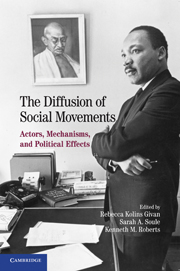Book contents
- Frontmatter
- Contents
- List of Tables
- List of Figures
- Contributors
- Preface and Acknowledgments
- 1 Introduction: The Dimensions of Diffusion
- PART I DIFFUSION AND THE FRAMING OF CONTENTIOUS POLITICS
- PART II MECHANISMS OF DIFFUSION
- 6 Dialogue Matters: Beyond the Transmission Model of Transnational Diffusion between Social Movements
- 7 The Diffusion of Different Types of Internet Activism: Suggestive Patterns in Website Adoption of Innovations
- 8 Transnational Networks, Diffusion Dynamics, and Electoral Change in the Postcommunist World
- 9 Diffusing the Rumor Bomb: “John Kerry Is French” (i.e., Haughty, Foppish, Elitist, Socialist, Cowardly, and Gay)
- PART III DIFFUSION, SCALE SHIFT, AND ORGANIZATIONAL CHANGE
- General Bibliography
- Index
8 - Transnational Networks, Diffusion Dynamics, and Electoral Change in the Postcommunist World
Published online by Cambridge University Press: 05 June 2012
- Frontmatter
- Contents
- List of Tables
- List of Figures
- Contributors
- Preface and Acknowledgments
- 1 Introduction: The Dimensions of Diffusion
- PART I DIFFUSION AND THE FRAMING OF CONTENTIOUS POLITICS
- PART II MECHANISMS OF DIFFUSION
- 6 Dialogue Matters: Beyond the Transmission Model of Transnational Diffusion between Social Movements
- 7 The Diffusion of Different Types of Internet Activism: Suggestive Patterns in Website Adoption of Innovations
- 8 Transnational Networks, Diffusion Dynamics, and Electoral Change in the Postcommunist World
- 9 Diffusing the Rumor Bomb: “John Kerry Is French” (i.e., Haughty, Foppish, Elitist, Socialist, Cowardly, and Gay)
- PART III DIFFUSION, SCALE SHIFT, AND ORGANIZATIONAL CHANGE
- General Bibliography
- Index
Summary
ELECTORAL CHANGE AND DIFFUSION DYNAMICS
From 1996 to 2005, eight countries in postcommunist Europe and Eurasia held elections that replaced illiberal leaders or their anointed successors with leaders of the democratic opposition. The impact of these elections varied. Some of the effects were important, but not earth-shaking – for instance, consolidating new and relatively fragile democratic orders (Bulgaria and Romania) or contributing to a more competitive politics in the context of mixed regimes that, although featuring some “democratic decorations,” had tilted in an increasingly dictatorial direction over time (Georgia and Kyrgyzstan). However, some of these elections had dramatic consequences – for example, ending a dangerous interlude of de-democratization (Slovakia), contributing to significant democratic progress following a period of increasingly authoritarian politics (Ukraine), or producing a veritable leap from dictatorship to democracy (Serbia and Croatia).
Despite these differences, however, all eight elections were pivotal political events because of one overarching commonality: By removing authoritarian leaders from office and replacing them with leaders of the democratic opposition, these elections had the common characteristic of investing in subsequent democratic development. Although such changes in leaders and political coalitions cannot by any means guarantee subsequent democratic progress, they are in fact a necessary condition for such progress to take place. This is in part because dictators rarely become democrats, although they can pretend otherwise for a time when it serves their domestic and international interests. Another reason is that elections are vitally important to the democratic project.
- Type
- Chapter
- Information
- The Diffusion of Social MovementsActors, Mechanisms, and Political Effects, pp. 140 - 162Publisher: Cambridge University PressPrint publication year: 2010
- 5
- Cited by



